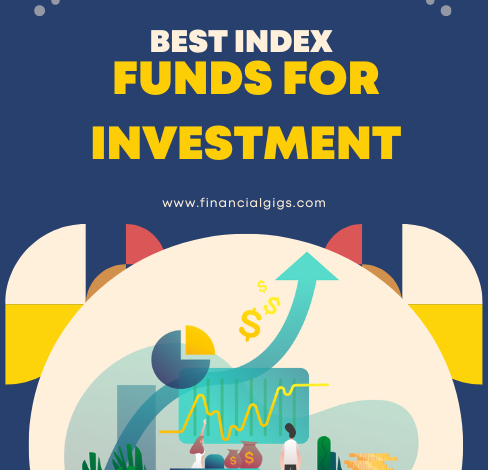Best Index Funds for Investment

Best Index Funds for Investment
Investing can feel like a maze, especially with the myriad of options available—stocks, bonds, ETFs, index funds, and more. However, for those looking for a simplified yet effective investment strategy, investment in index funds often stands out. In this guide, we’ll delve into the best index funds for investment to help you navigate your financial future wisely. Not only will we highlight the top-ranked index funds for investing, but we’ll also demonstrate the benefits of investing in index funds for long-term growth. Whether you’re a novice investor pondering over index funds vs mutual funds for beginners or someone keen on knowing how to choose the best index funds, this comprehensive post covers it all. We will reveal our curated list of the top index funds to invest in and explore the best index mutual funds that can amplify your portfolio. Stay tuned as we unfold practical tips for successful investment in index funds, ensuring you make informed decisions on the best index funds to buy.
Best Index Funds for Investment Overview of Index Funds
Investing in index funds has become an increasingly popular strategy for both novice and seasoned investors. But what exactly are index funds? In a nutshell, an index fund is a type of mutual fund or exchange-traded fund (ETF) designed to replicate the performance of a specific index. These indices can be broad, like the S&P 500, or more specialized, focusing on sectors such as technology or healthcare.
What Makes Index Funds Unique?
- Diversification: One of the key benefits of investing in index funds is the inherent diversification they offer. By holding a slice of every stock in an index, these funds mitigate the risk associated with individual stock picking.
- Low Costs: Index funds are generally more cost-effective compared to actively managed funds. They typically have lower expense ratios because they don’t require the same level of management and research.
- Simplicity: These funds are ideal for investors seeking a straightforward, hands-off approach to investing. You don’t need to worry about constant buying or selling.
Key Characteristics of Index Funds:
| Feature | Description |
|---|---|
| Passive Management | Index funds aim to mirror the performance of a specific index rather than outperform it. |
| Broad Market Exposure | These funds provide exposure to a wide range of sectors and assets, making them highly diversified. |
| Cost-Efficiency | Lower fees mean you keep more of your investment gains, enhancing your potential returns. |
With Investment in Index Funds, you can achieve a balanced portfolio with minimal effort. Whether you’re interested in Best Index Funds to Buy or exploring Top Index Funds to Invest In, understanding the fundamental aspects of index funds is your first step towards successful investments.
By considering the points above, you will be better equipped to make informed decisions about incorporating index funds into your investment portfolio. This approach aligns with modern, prudent financial planning and can be especially beneficial for those new to the investing landscape.
Best Index Funds for Investment Benefits of Investing in Index Funds
Investing can be an overwhelming journey, especially with the multitude of options available. However, investment in index funds stands out due to its simplicity and efficiency. Let’s delve deeper into the numerous benefits of investing in index funds.
Low-Cost Advantage
One of the most significant attractions of index funds vs mutual funds for beginners is the low cost involved. Index funds typically have lower expense ratios because they are passively managed. Unlike actively managed funds, index funds don’t require a team of analysts and managers to pick stocks, which translates into cost savings for investors.
Diversification
Investment in index funds offers instant diversification. By investing in a single index fund, you get exposure to a broad spectrum of stocks across various sectors. This diversification helps spread the risk, ensuring that if one stock underperforms, it doesn’t significantly affect the overall performance of your portfolio.
Consistent Performance
Historically, top index funds for investment have consistently matched the returns of the broader market. While actively managed funds may outperform in the short term, their performance can be unpredictable. Index funds, on the other hand, track market indices, providing a steady return over the long term.
Simplicity and Transparency
How to choose the best index funds becomes a straightforward task due to the simplicity and transparency index funds offer. They mirror specific market indices, making them easy to understand. Investors clearly know what they are investing in, as the holdings of the index funds are publicly available.
Tax Efficiency
Another edge of top index funds to invest in is their tax efficiency. Frequent trading in actively managed funds can lead to capital gains taxes. Since index funds follow a buy-and-hold strategy, they incur fewer capital gains taxes, benefiting investors during tax season.
Here’s a comparison table to illustrate the key benefits:
| Benefit | Description |
|---|---|
| Low Costs | Lower expense ratios due to passive management. |
| Diversification | Exposure to a broad spectrum of stocks, reducing overall risk. |
| Consistent Returns | Steady returns matching the market indices over the long term. |
| Simplicity | Easy to understand and transparent investment strategy. |
| Tax Efficiency | Fewer capital gains taxes due to minimal trading. |
In conclusion, the benefits of investing in index funds make them an attractive option for many investors, from beginners to seasoned pros. Whether you are seeking best index mutual funds or eyeing the top-ranked index funds for investing, their low cost, diversification, and consistency can serve as a solid foundation for your investment portfolio.
Best Index Funds for Investment How to Choose the Best Index Funds
Choosing the Best Index Funds for Investment can be a daunting task, especially for beginners. However, knowing what to look for can simplify the process significantly. Below are some key factors to consider when selecting the right index funds for your investment portfolio.
Understand Your Investment Goals
Before diving into any investment, it’s crucial to understand what you’re aiming to achieve. Are you investing for retirement, buying a home, funding education, or simply for wealth accumulation? Your goals will influence the type of index funds you choose. Different funds focus on various sectors, markets, and risk levels. Therefore, aligning your investment goals with specific index funds can lead to more gratifying outcomes.
Analyze Expense Ratios
Expense ratios represent the annual fees that investors pay to the fund’s management. Lower expense ratios generally mean higher returns over the long run. When comparing Top Index Funds to Invest In, aim for those with expense ratios below 0.5%. Even small differences in these fees can add up over time, significantly affecting your returns.
Evaluate Fund Performance
While past performance isn’t a guarantee of future results, it can provide valuable insights into how a fund has managed market volatility and growth over time. Look for Best Index Mutual Funds that have shown consistent performance. Review the fund’s performance over 1-year, 3-year, 5-year, and 10-year periods for a comprehensive understanding.
Historical Performance of Fund A and Fund B
| Time Period | Fund A (5-Year Avg. Return) | Fund B (5-Year Avg. Return) |
|---|---|---|
| 1-Year | 8.5% | 7.8% |
| 3-Year | 10.2% | 9.6% |
| 5-Year | 11.4% | 10.8% |
Diversification
Diversification is another key element when considering Top Index Funds for Investment. A well-diversified index fund can offer exposure to various sectors and geographies, thereby spreading risk. S&P 500 index funds, for example, offer exposure to 500 of the largest companies in the U.S., providing a balanced risk-reward ratio.
Check Minimum Investment Requirements
Different index funds have unique minimum investment requirements. Some may require as little as $500, while others might need $3,000 or more. Ensure that the minimum investment aligns with your budget and financial plans.
Read Fund Reviews and Ratings
Once you’ve narrowed down your options, read through reviews and ratings from reputable financial analysts and investment websites. Top-Ranked Index Funds for Investing often have strong ratings, providing additional peace of mind regarding their credibility and performance.
Seek Professional Advice
If you’re still unsure about how to choose the best index funds, consulting with a financial advisor can be invaluable. An expert can offer personalized investment advice tailored to your specific financial situation, investment goals, and risk tolerance.
Choosing the Best Index Funds to Buy involves a blend of understanding your goals, evaluating costs, and analyzing market performance. Armed with this knowledge, you can make more informed decisions and set yourself on the path toward successful investment in index funds.
Best Index Funds for Investment Top-Ranked Index Funds for Investing
Investing in top-performing index funds is a strategy that has stood the test of time, offering both novice and seasoned investors a balanced mix of risk and reward. When seeking Top Index Funds to Invest In, several options consistently garner praise for their performance, low expense ratios, and diversification. Below, we’ll highlight some of the best choices for your investment portfolio.
Top Picks for Index Funds
- Vanguard 500 Index Fund (VFIAX)
- Expense Ratio: 0.04%
- Benchmark Index: S&P 500
- Key Benefits: Broad exposure to 500 of the largest U.S. companies, excellent historical returns, low costs.
- Fidelity ZERO Large Cap Index (FNILX)
- Expense Ratio: 0.00%
- Benchmark Index: Fidelity U.S. Large Cap Index
- Key Benefits: Zero expense ratio, tracks large-cap U.S. stocks, ideal for cost-conscious investors.
- Schwab S&P 500 Index Fund (SWPPX)
- Expense Ratio: 0.02%
- Benchmark Index: S&P 500
- Key Benefits: Extremely low expense ratio, broad diversification, high liquidity.
- iShares Core S&P 500 ETF (IVV)
- Expense Ratio: 0.03%
- Benchmark Index: S&P 500
- Key Benefits: High liquidity, low costs, tracks the full S&P 500 index.
- SPDR S&P 500 ETF Trust (SPY)
- Expense Ratio: 0.09%
- Benchmark Index: S&P 500
- Key Benefits: One of the oldest S&P 500 ETFs, highly liquid, consistent performer.
Here’s a quick comparison to help guide your investment decisions:
| Fund Name | Expense Ratio | Benchmark Index | Key Benefits |
|---|---|---|---|
| Vanguard 500 Index (VFIAX) | 0.04% | S&P 500 | Broad exposure, low costs |
| Fidelity ZERO Large Cap (FNILX) | 0.00% | Fidelity U.S. Large Cap | Zero expenses, tracks large-cap U.S. stocks |
| Schwab S&P 500 Index (SWPPX) | 0.02% | S&P 500 | Low cost, broad diversification |
| iShares Core S&P 500 (IVV) | 0.03% | S&P 500 | High liquidity, low costs |
| SPDR S&P 500 ETF Trust (SPY) | 0.09% | S&P 500 | Oldest S&P 500 ETF, highly liquid |
Investing in these Best Index Funds for Investment offers a path to steady growth with minimal effort. Whether you’re looking for the Best Index Funds to Buy or exploring Top Index Funds for Investment, these funds provide reliable exposure to the broader market.
Coupling this knowledge with a strategic approach to Investment in Index Funds can enhance your portfolio’s resilience and long-term gains. By selecting from these Top-Ranked Index Funds for Investing, you’re equipped to make an informed and effective choice, rooted in financial stability and growth potential.
Index Funds vs Mutual Funds for Beginners
In the world of investment, the debate of Index Funds vs Mutual Funds for Beginners is common. Both investment options present unique advantages, but understanding their differences is crucial, especially for beginners.
An index fund is a type of mutual fund that’s designed to replicate the performance of a specific index, such as the S&P 500. This approach typically results in lower fees and expenses, making them among the Best Index Funds for Investment for cost-conscious investors.
On the other hand, a mutual fund can be actively managed, where fund managers make decisions about how to allocate assets to beat the market. This often comes with higher management fees but the potential for higher returns.
Here is a breakdown to help you understand better:
| Factors | Index Funds | Mutual Funds |
|---|---|---|
| Management Type | Passively managed | Actively managed |
| Cost | Lower fees and expenses | Higher management fees |
| Performance | Matches the performance of an index | Aims to outperform the market |
| Risk | Generally lower risk due to market mirroring | Can be higher due to active management |
| Simplicity | Easier for beginners | Requires understanding of fund strategies |
Best Index Funds for Investment Key Differences to Consider:
- Management Cost: Index funds are generally more cost-effective, making them one of the Best Index Funds to Buy if you’re budget-conscious.
- Performance Potential: Mutual funds can offer higher returns since they aim to outperform the market through active management.
- Risk Level: Index funds typically offer lower risk due to their market mirroring strategy.
Quick Tips for Beginners:
- Consider Your Goals: If you are looking for low-cost, stable returns, index funds might be the Top Index Funds to Invest In for your portfolio.
- Evaluate Fees: Always compare the expense ratios. Lower fees often lead to better net returns.
- Research Funds: Understanding the underlying assets of both index and mutual funds is crucial.
Ultimately, the choice between Index Funds and Mutual Funds for Beginners boils down to individual financial goals, risk tolerance, and investment horizon. Both have their benefits, and a balanced portfolio may even include a mix of both to diversify and maximize returns.
Best Index Funds for Investment Best Index Mutual Funds to Buy
When it comes to securing your financial future and growing your wealth, selecting the Best Index Mutual Funds to Buy can be a game-changer. These funds are designed to replicate the performance of a specific market index, offering investors broad market exposure with a low expense ratio. But where should you start? Here’s a list of some Top Index Funds to Invest In:
Vanguard 500 Index Fund (VFIAX)
Overview: Often heralded as the gold standard of index funds, VFIAX aims to track the performance of the S&P 500 Index.
Key Benefits:
- Low Expense Ratio: Only 0.04%, making it a cost-effective choice.
- Diversification: Owns the stocks of 500 of the largest U.S. companies.
Fidelity ZERO Total Market Index Fund (FZROX)
Overview: This is a newer addition to the market, but it’s making waves by offering a zero expense ratio.
Key Benefits:
- No Fees: A zero-expense ratio means you get the full benefit of the market’s return.
- Broad Market Exposure: Mirrors the performance of the total U.S. stock market.
Schwab S&P 500 Index Fund (SWPPX)
Overview: A solid competitor to Vanguard’s VFIAX, this Schwab fund also tracks the S&P 500 Index.
Key Benefits:
- Low Cost: Expense ratio of only 0.02%.
- Accessibility: Lower minimum investment requirements compared to its peers.
Best Index Funds for Investment Comparison Table of Top-Ranked Index Funds for Investing
| Fund Name | Expense Ratio | Minimum Investment | Market Exposure |
|---|---|---|---|
| VFIAX | 0.04% | $3,000 | S&P 500 |
| FZROX | 0.00% | $0 | Total U.S. Market |
| SWPPX | 0.02% | $0 | S&P 500 |
Best Index Funds for Investment Why These Funds Are the Best Index Funds for Investment
These Best Index Mutual Funds provide robust market coverage at minimal costs, ensuring that more of your investment works for you. The funds also offer the benefits of investing in index funds such as simplicity, long-term growth potential, and reduced risks due to diversification.
Before You Buy: Key Tips
- Understand Your Goals: Align your investment choice with your financial objectives and risk tolerance.
- Check the Expense Ratios: Even slight differences can add up over time.
- Research Fund Performance: Historical performance can give you insights, but remember past performance is not indicative of future results.
By carefully evaluating your options and understanding the key aspects of each fund, you can confidently select the Top Index Funds for Investment that align with your financial goals.
Best Index Funds for Investment Tips for Successful Investment in Index Funds
Investing in index funds can be a wise strategy, but like any investment, it requires careful consideration and planning. To help you navigate this journey, here are some essential tips for successful investment in index funds:
1. Understand the Market
Before diving in, take the time to understand the stock market and how index funds operate. Knowledge is your best ally. Researching the benefits of investing in index funds will help you make informed decisions and set realistic expectations.
2. Determine Your Investment Goals
Clearly define what you aim to achieve with your investments. Whether you’re looking for long-term growth, retirement planning, or short-term gains, your goals will influence your selection of the Top Index Funds to Invest In.
3. Assess Your Risk Tolerance
Everyone has a different comfort level when it comes to risk. Assess your risk tolerance honestly to ensure that your investment choices align with your personal comfort zone. Index funds offer varying levels of risk, so choose wisely based on your risk profile.
4. Diversify Your Portfolio
Diversification is a key principle to reduce risk. Don’t put all your eggs in one basket. Consider a mix of Top Index Funds for Investment across different sectors and geographic regions to better manage risk and potential returns.
5. Monitor Expense Ratios
Expense ratios are a critical factor to consider. Low expense ratios can significantly enhance your returns over time. Therefore, always compare the expense ratios when selecting the Best Index Funds to Buy.
6. Consider Fund Performance and Reputation
Look into the historical performance of the index funds. While past performance is not a guarantee of future results, it can serve as a useful indicator. Additionally, consider funds from reputable providers known for their reliable performance.
7. Automate Your Investments
Set up automatic investments to ensure consistency and take advantage of dollar-cost averaging. This strategy helps to mitigate the impact of market volatility on your investments, thereby building wealth over time systematically.
Key Points
| Tip | Description |
|---|---|
| Understand the Market | Research the market and index funds operations. |
| Investment Goals | Define your goals to guide your investment choices. |
| Risk Tolerance | Assess personal risk comfort before choosing funds. |
| Diversify Portfolio | Spread investments across various sectors and regions. |
| Monitor Expense Ratios | Compare expense ratios to enhance returns. |
| Fund Performance | Evaluate historical performance and provider reputation. |
| Automate Investments | Use automatic investments for consistent wealth building. |
By following these tips for successful investment in index funds, you can maximize your investment returns while minimizing risks. Remember, patience and consistency are your greatest allies in achieving long-term financial success.



